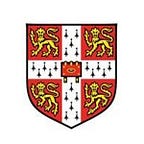The engineering student who gets his kicks from playing with the Pythons
When he’s not catching passes in the backfield and blocking the opposition, Kiran Singh Jolly — a running back with Cambridge University’s American Football Club — is learning about jet engines and leading the Sikh Society.
If you’d asked me what I’d be doing at University a couple of years ago, I definitely wouldn’t have said playing American Football and leading the Sikh Society. I thought I’d just be here for my engineering degree.
I’d never played American football before I came to Cambridge. I didn’t even realise it was a sport played at universities until I saw the Pythons’ stall at the Freshers’ Fair. At the taster session I realised I could catch quite well so I decided to stay on.
I’m a running back — this means I get the ball and run up the field as far as I can, trying not to get hit! When the quarterback is passing the ball my job is to block anyone who is trying to get to him.
I thought the Pythons might be intimidating but actually everyone is really down to earth and welcoming. You go through so many emotional highs and lows together that you form a close bond really quickly.
Training is a good way to unwind from academic studies. When you’re playing, your mind has to be on the game so you’re distracted from everything else that’s going on.
I am also President of the Sikh Society (CUSikhSoc). We connect Sikhs across the University and Anglia Ruskin University, as well as our alumni. Not all Sikh students know about us so a large part of my role is getting the word out about the society. We also aim to teach people about Sikhism.
At the very centre of a Sikh’s belief is the concept of Langar. In each and every Gurdwara (Sikh place of worship), there is a Langar kitchen, all run by volunteers. In essence, we provide a free meal to anyone, regardless of their background. Langar originated at the time of the Gurus. The first Guru, Guru Nanak Dev Ji, encouraged all people — from the richest of the rich to the poorest of the poor — to sit on the floor together and break bread. The message was that, for a Sikh, humility, generosity and good deeds are just as important and prayer and spirituality.
We thought it would be nice to give back and in a sense ‘practice what we preach’. We went to the Gurdwara one Friday evening and, with the help of the volunteers there, made curry and rice to give out to the people who are homeless in Cambridge.
Out on the streets I felt so proud of what we were doing. People were very friendly. Many were keen to learn about who we were, as Sikhs, and about Langar, and they were appreciative of a simple conversation, let alone the food.
It was nice to be able to give, not only a meal, but a hot, freshly cooked meal. I think it makes the difference when you’ve paid for something in time rather than money — you have a more personal connection with the person you are helping. At the end of the evening everyone was tired but very happy. We all want to do it again.
There wasn’t a specific point that I decided I wanted to be an engineer, it was more a natural progression. My parents really made me love learning. I remember my Dad giving me an electronics kit with magnets — maybe this is why I’m really into electronics right now.
It’s amazing to think that the universe can be described by numbers. Growing up in North London I’d always loved science. As I got older and the equations I learnt about became more intricate, I developed a passion for maths.
The first lab you do as an engineer at Cambridge is essentially playing with Lego. I don’t know if Lego causes someone to love engineering or vice versa — but there’s definitely a strong connection.
There are parts of the engineering course I’m better at than others but I still find everything fascinating. Recently we’ve been learning about jet engines which were invented by Sir Frank Whittle, an alumnus of Cambridge engineering. To think that I’m part of a University that has changed the world is amazing to me.
So many breakthroughs and advances in science and maths have happened here. When I first visited Cambridge on an Open Day I was mesmerised and immediately fell in love with the place.
Coming here as a student, I was no longer just looking on in wonder at all that has happened here — I was part of it myself. Studying here, you feel you have the potential to become part of the legacy Cambridge has left. Even to this day I’ll walk into Trinity Great Court and think: “How did I get here?” It just blows your mind sometimes.
To everyone thinking of applying I’d just say: “apply!” If you don’t apply you know you won’t get in, so why not take the shot?
Watch the Cambridge Pythons battle the Oxford Lancers at the Varsity Bowl 2019 on 3 May 7:30–10pm at Grange Road Stadium.
This profile is part of our This Cambridge Life series, which opens a window on to the people that make Cambridge University unique. Cooks, gardeners, students, archivists, professors, alumni: all have a story to share.
Photography by Nick Saffell, words by Charis Goodyear.
